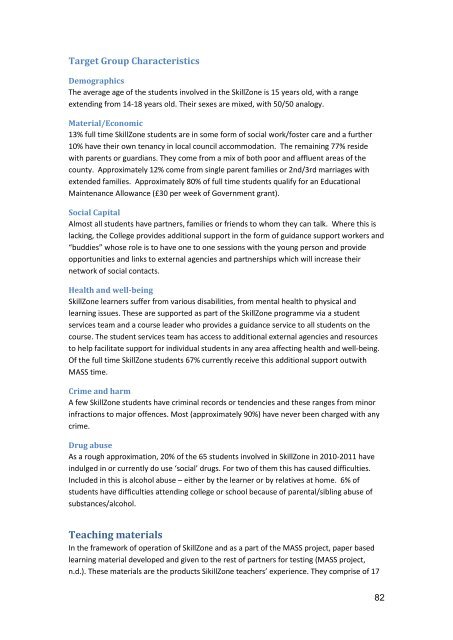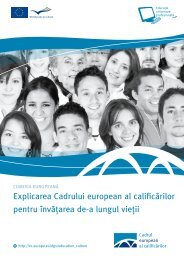Teaching and Assessing Soft Skills - MASS - Measuring and ...
Teaching and Assessing Soft Skills - MASS - Measuring and ...
Teaching and Assessing Soft Skills - MASS - Measuring and ...
You also want an ePaper? Increase the reach of your titles
YUMPU automatically turns print PDFs into web optimized ePapers that Google loves.
Target Group Characteristics<br />
Demographics<br />
The average age of the students involved in the SkillZone is 15 years old, with a range<br />
extending from 14-18 years old. Their sexes are mixed, with 50/50 analogy.<br />
Material/Economic<br />
13% full time SkillZone students are in some form of social work/foster care <strong>and</strong> a further<br />
10% have their own tenancy in local council accommodation. The remaining 77% reside<br />
with parents or guardians. They come from a mix of both poor <strong>and</strong> affluent areas of the<br />
county. Approximately 12% come from single parent families or 2nd/3rd marriages with<br />
extended families. Approximately 80% of full time students qualify for an Educational<br />
Maintenance Allowance (£30 per week of Government grant).<br />
Social Capital<br />
Almost all students have partners, families or friends to whom they can talk. Where this is<br />
lacking, the College provides additional support in the form of guidance support workers <strong>and</strong><br />
“buddies” whose role is to have one to one sessions with the young person <strong>and</strong> provide<br />
opportunities <strong>and</strong> links to external agencies <strong>and</strong> partnerships which will increase their<br />
network of social contacts.<br />
Health <strong>and</strong> well-being<br />
SkillZone learners suffer from various disabilities, from mental health to physical <strong>and</strong><br />
learning issues. These are supported as part of the SkillZone programme via a student<br />
services team <strong>and</strong> a course leader who provides a guidance service to all students on the<br />
course. The student services team has access to additional external agencies <strong>and</strong> resources<br />
to help facilitate support for individual students in any area affecting health <strong>and</strong> well-being.<br />
Of the full time SkillZone students 67% currently receive this additional support outwith<br />
<strong>MASS</strong> time.<br />
Crime <strong>and</strong> harm<br />
A few SkillZone students have criminal records or tendencies <strong>and</strong> these ranges from minor<br />
infractions to major offences. Most (approximately 90%) have never been charged with any<br />
crime.<br />
Drug abuse<br />
As a rough approximation, 20% of the 65 students involved in SkillZone in 2010-2011 have<br />
indulged in or currently do use ‘social’ drugs. For two of them this has caused difficulties.<br />
Included in this is alcohol abuse – either by the learner or by relatives at home. 6% of<br />
students have difficulties attending college or school because of parental/sibling abuse of<br />
substances/alcohol.<br />
<strong>Teaching</strong> materials<br />
In the framework of operation of SkillZone <strong>and</strong> as a part of the <strong>MASS</strong> project, paper based<br />
learning material developed <strong>and</strong> given to the rest of partners for testing (<strong>MASS</strong> project,<br />
n.d.). These materials are the products SikillZone teachers’ experience. They comprise of 17<br />
82





